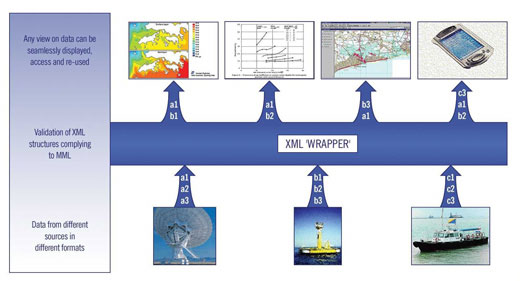|
|||
MarineXML: Towards Global Standards for Marine Data Interoperabilityby Brian Matthews In a partnership with international agencies, the European 'Marine XML' project will demonstrate that XML can be used to support marine observation systems. Our management of the marine environment and marine risks is restricted by the lack of interoperability between the huge diversity of data formats, proprietary data management systems, numerical models, and visualisation tools. Different studies, instruments, programs, and data centres collect, process, analyse and archive data on the marine environment in such different ways that exchanging and comparing information between them to build a unified picture of the world's seas and oceans becomes a difficult task. Consequently, opportunities to better monitor and manage the marine environment are missed.
The aim of EU Marine XML project is to demonstrate that the Extensible Mark-up Language (XML) technology from the World-Wide Web Consortium (W3C) can be used to improve data interoperability for the marine community, and specifically in support of marine observing systems, whilst not rendering investment in existing systems obsolete. MarineXML is a partnership with international agencies, such as the International Oceanographic Commission (ICES-IOC) and the Global Ocean Observing System (EuroGOOS), and government departments and organisations responsible for data standards clustered around the North Sea (UK, Belgium, the Netherlands, Germany and Norway). Their participation will ensure that the research meets the needs of key stakeholders with interests in global ocean observing systems. The objectives of the project are:
The project is demonstrating that XML technology can be used to develop a framework that improves the interoperability of data for the marine community. The MarineXML Project will not result in the creation of a full MML specification but the project is addressing the underlying framework issues of interoperability between existing and emerging standards. It will provide a technical basis for the development of full specification, and look to standardisation post project through the IOC/ICES working group on XML for marine applications. Please contact: |
|||



